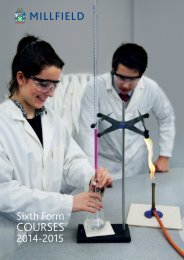COURSES
You also want an ePaper? Increase the reach of your titles
YUMPU automatically turns print PDFs into web optimized ePapers that Google loves.
Biology<br />
Overview<br />
Studying Biology gives you the opportunity to find<br />
out more about living things, how your body works<br />
and enables you to have a better understanding of all<br />
the new developments in medicine and biotechnology<br />
that are having a real impact on our lives. Biology<br />
gives you the opportunity to study a science, but<br />
with a background of additional science at GCSE<br />
there is no need to do either physics or chemistry<br />
as well. Pupils wishing to go on to study Biological<br />
Sciences, Medicine, Dentistry or Veterinary Science<br />
at university must usually take Chemistry as well.<br />
An A level in Biology will place you in a good position<br />
when applying for university. Courses such as<br />
Physiology, Physiotherapy, Sport Science, Zoology,<br />
Natural Sciences, Biochemistry and Ecology are all<br />
available to pupils who have studied Biology.<br />
Approach<br />
We place a great deal of emphasis on practical work.<br />
The ‘How Science Works’ approach from GCSE is<br />
carried on and extended at A level. You will need to<br />
understand how investigations are planned and what<br />
to do with the data that is collected. You will need<br />
to be able to make observations and record these<br />
accurately. There is a lot of application required and<br />
analysis and evaluation of data, which will give you<br />
practice in these skills which can then be transferred<br />
and used in a huge variety of courses and<br />
employment situations in the future.<br />
Pupils who do well on this course will have developed<br />
the ability to think critically, use data presented in a<br />
variety of different ways and apply their knowledge<br />
to novel situations; all excellent skills for the work<br />
place. Where practical work is not possible because<br />
the process cannot be seen (such as the replication<br />
of DNA), computer-based modelling is used.<br />
In both years there are theory exams and a unit of<br />
coursework, which involves carrying out a set<br />
practical task and then completing a written<br />
examination paper based on this task.<br />
The theory papers are mainly in the form of short<br />
answer questions; in the final A2 paper one essay is<br />
required.<br />
You should be happy with performing calculations<br />
(percentages, rates, ratios etc.) and using graphs, but<br />
the mathematical skills required are not beyond<br />
those required at GCSE level.<br />
To help you monitor your progress, topic tests are<br />
carried out across the whole year group at regular<br />
intervals and these results are relayed to parents<br />
in the reports. There is quite a lot of factual<br />
information that needs to be learnt and you must be<br />
prepared to review your notes outside of lesson time.<br />
The Biology department is very well resourced and<br />
well supported by three technicians. Class sizes at AS<br />
are typically 13/14 and 8/10 at A2.<br />
Course outline<br />
AS<br />
Unit 1: Biology and Disease. The key principles are<br />
introduced here, including: cell structure, enzymes<br />
and the way substances enter and leave cells. With<br />
this knowledge in place pupils then move on to look<br />
at how disease affects the body. Cholera, lung and<br />
heart disease are all considered.<br />
Unit 2: The Variety of Living Organisms.<br />
Again the key principles are looked at to enable<br />
pupils to understand how species have evolved.<br />
The structure and function of DNA is studied and<br />
we look at how cells divide.<br />
The adaptations of species to their environment and<br />
other key areas, such as the importance of surface<br />
area and the transport of oxygen around the body,<br />
are also studied.<br />
Unit 3: Practical task.<br />
18<br />
Millfield Sixth Form Courses 2014-2015



